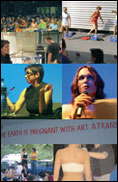Líneas de investigación
Proyectos en Curso
Proyectos Anteriores
 Desacuerdos
Desacuerdos  Seminar Mutations of Feminism: Genealogies and Artistic Practices
Seminar Mutations of Feminism: Genealogies and Artistic Practices
Seminar Mutations of Feminism: Genealogies and Artistic Practices |
|
Venue: Arteleku-Diputación Foral de Gipuzkoa
PRESENTATIONPRESENTATION
In order to understand the transformations of the various feminist languages and practices as a result of the changes in historical and political conditions of the past thirty years, we shall pose our questions taking the political urgency of the current moment into account. We shall return to feminist traditions from a modern perspective. To this aim, we shall travel to the frontiers of feminism with post-colonial criticism, with trans-gender politics, and with drag King masculinity performances. The idea is to question other peripheries from which we can interpret our own eccentricity. This seminar is conceived as a continuation of, and a space for, the confluence between two workshops: La repolitización del espacio sexual en las prácticas artísticas contemporáneas (The Re-politicisation of Sexual Space in Contemporary Artistic Practices) held at Arteleku in September 2004, and Tecnologías del Género (Gender Technologies) at the Macba. La repolitización del espacio sexual proposed a journey through some of the contemporary artistic practices with the aim of analysing the influence that queer theories and practices have had on feminist policies concerning identity, gender, and sexual difference. The Tecnologías del género workshop, which started in 2004 and will continue through 2005, is a laboratory in which the traditional relationship between aesthetics and politics can be altered: we can talk about the politics of forms and the cellular aesthetics of collective passions. An equation resulting in a chiasm in which the theatralisation of public space (performative politics) meets the exhaustive experimentation in the field of subjectivity (techno-biopolitics). It is a Spinozism of political micro-passions: a space in which to experiment with hormone doses, visual and textual devices, tags, labelling, porno codes, cybernetic circuits… We propose three weeks of conferences, debates, workshops, performances, and music, all structured around a theoretical and political framework from the feminist, post-feminist, lesbian, queer and trans-gender points of view. Constructing the Archive: the Tecnologías del Género workshop of the Macba will publish a special issue of the PIG Magazine (PIG stands for Plataforma de Invención de Géneros/Postporno Ibérico Guerrillero or Platform for the Invention of Genders/ Iberian Warrior Postporn) containing an accessible archive of the various debates, workshops, conferences... of the Mutaciones del feminismo (Mutations of Feminism) Seminar.
PROGRAMMEPROGRAMME
Monday, 4 April 2005
· 19:00 h.
Tuesday, 5 April 2005
Wednesday, 6 April 2005
· 19:00 h.
Thursday, 7 April 2005
Friday, 8 April 2005
· 19:00-21:00
Saturday, 9 April 2005
Monday, 11 April 2005
Tuesday, 12 April 2005
Wednesday, 13 April 2005
· 19:00 h.
Thursday, 14 April 2005
· 19:00 h.
Friday, 15 April
2005
Saturday, 16 April 2005
· 21:00 Drag King parade and prize to the best Drag King outfit selected by the club run by King Beto. Performance, screenings, video, and music by DJ Victor Little King.
Monday, 18 April 2005
· 17:00-20:00
Tuesday, 19 April 2005
Wednesday, 20 April 2005
Thursday, 21 April 2005
Friday, 22 April 2005
Saturday, 23 April 2005
· 19:00- 21:00
· 21:00
GUESTSGUESTS Empar Pineda. Participated in the creation of the feminist Coordinadora Feminista de Cataluña. (Federation of Catalan feminist groups). Founded Madrid's Lesbian Feminist Group. Was awarded the Margarita Borrás prize in 2004, an award given to individuals and institutions in recognition of their work to defend the rights of sexual minorities. Miren Jaio. Critic and Art History teacher. Collaborates in various publications. Alaitz Arenzana. Audiovisual artist who works in video and films. Maria Ibarretxe. Studies drama and contemporary dance. They are both members of the Sra. Polaroiska en sillón de taller group with which they have made the short film Pero tú... ¿eres tú? no, yo soy su... [But you…..is it you? No, I am her….](Injuve 2003 and Mecal Prize). They collaborate in projects involving performance, scenic creations, choreographies and audiovisuals. Adelina Moya. History of Art teacher at the UPV/EHU, where she teaches the subject Art and Women. Has published writings on the work of numerous women artists. In collaboration with Rosalind Williams, curated the exhibition Nicolás de Lekuona. Imagen y testimonio de la vanguardia (Nicolás Leukona: Image and Testimony of the Avant Garde) for Artium and MNCARS. Cathy Lomax. Artist. Director of the Transition Gallery in London and editor of the Arty fanzine. Juanita Díaz-Cotto. Teacher of Feminism and Latin American Studies at the State University of New York, Binghamton. Editor of the anthology Compañeras: Latina Lesbians and author of Gender Ethnicity and the State: Latina and Latino Prison Politics. Cabello/Carceller. Artists. Art critics for numerous publications and curators of the Zona F exhibition at the Espai d'Art Contemporani in Castellón. Cristina Garaizabal. Psychologist. Founder of the Hetaira collective Hetaira. Collective which has been working for the recognition of the rights of sex workers. Received the 2003 René Cassin Prize for Human Rights from the Basque Government. Susana Blas. Contemporary art historian, specialist in audiovisual creations. Writes for Metropolis (TVE2) and curates the permanent video-art programme (VIDEOMIX) at La Casa Encendida, Madrid. Medeak. Activist feminist women's group from Gipuzkoa. Collaborates with the Plazandreok collective. Carme Nogueira. Artist. Works in the worlds of photography and installations. Author of La rePresentation como puesta en escena: para una teoría de la mirada (2001). Co-founder of the arts and culture magazine Fé. Asamblea de Mujeres de Granada. Association established in 1975. A plural space for activism and the debate and diffusion of feminist discourses. Miguel Benlloch. Has worked on the deconstruction of sexual identity through performances and documented actions filmed in video. Formed part of the group Cutre Chou. Promoted the creation of the Frente de Liberación Homosexual de Andalucía (Andalusian Front for the Liberation of Homosexuals) at the end of the 70's and the Coordinadora Estatal de Frentes de Liberación Homosexual del Estado Español (National Federation of Spanish Fronts for the Liberation of Homosexuals ) in the 80's. Diane Torr Les Kings du Berry. Drag King performance group created in 2004. Collective of dykes and transsexuals whose political and artistic aim is to establish connections between popular culture and trans-gender activism. Queer MC is their first Hip Hop scenic creation. Victor Little King. Drag King Performer and activist. His performances question the mediatisation of gay identity, the commercialisation of queer chic or the racialisation of homophobia. Has performed with Antonia Baehr and King Murray Hill at king shows staged in Paris and New York. O.R.G.I.A. Interdisciplinary Collective which has developed artistic and research work on sexual and identity politics from a transversal position. Post-Op. Group born from the Maratón Posporno (Post-porn Marathon) event held at the MACBA in June 2003. Their objective is to address sexuality and gender from the viewpoints of body and performance. GenderLab: Protopoesía_01. Laboratory of body modifications. Composition: Proto-poetic techniques. Action: public sex. Contraindications: potential loss of static and hetero-centred body morphology. Corpus Deleicti, Barcelona, 2005. Begoña Hernández. Lawyer and artist, member of the Zer@ collective.
José Luis Rebollo (Madelman,
Chen Le Bon) and Alicia San Juan (Rose Genís Segarra. Member of the groups Hidrogenesse y Astrud, creators of the record label Austrohúngaro. Their work with Hidrogenesse includes Gimnàstica passiva [Passive Gymnastics] (2002). With Astrud they produced Performance (2004), Gran fuerza [Great Strength] (2001) and Mi fracaso personal [My Personal Failure] (1999). Laurence Rassel. Cyber-feminist. Member of Constant (www.constantvzw.com), an artistic organisation based in Brussels which organises digital culture events. Coordinator of projects for a Belgian network which promotes and investigates centres to train women in the field of new technology. Del La Grace Volcano. Photographer and film maker. Defines himself as a gender terrorist and a designer intersexual. His work pioneered self-rePresentation of the dyke, Drag King and transsexual cultures. Has published LoveBites (1991), The Drag King Book, (1999) in collaboration with Judith 'Jack' Halberstam, and Sublime Mutations (2000). Lalla Kowska. Starts her career in 2004, year nº 33 as Jean Christian Régnier. Jicé, Berber-Polish bastard, was a good fag: adolescent militant in the first years of Act-Up Paris, activist in the prison commission, and later became vice-president of communication. Joins Canal +, where she chronicles sexual and gender life. Has now decided to improve her witchcraft skills and feeds on estrogens. Moisés Martínez. Created in 2000 the Grup de Transsexuals Masculins de Barcelona (www.transmasculins.org), the first group of FtM transsexuals in Spain. Activist of the Col·lectiu Gai de Barcelona (www.colectiugai.org). Participates in the documentary on male transexuality El camino de Moisés [Moses' way] (2002) directed by Cecilia Barriga. Natalia Angel. Visual artist. Has worked with the Function Variable collective. Author of the photographs for the publication Barcelona Imaginada [Imagined Barcelona] (2004). Collaborates with the magazines Le cool and AB and on the book Barcelona Jumps. Participates in the Porn oh! World project which is curated by Alex Brahim. María José Belbel. Has taken part in projects on feminism, translation, and cultural production. Participated in the 100% exhibition (Seville, 1993). Erreakzioa-Reacción. Collective set up in 1994 by Estibaliz Sadaba and Azucena Vieites as a space for artistic/cultural/activist creation focusing on art and feminism. Beatriz Preciado. Teacher of body, gender, and performance theories at the University of Paris VIII. Author of Manifiesto contrasexual [Contrasexual Manifesto] (2000) and numerous essays on gender, sexuality, and technology.
|
||

 How to define feminism in the post-industrial
and post-colonial societies of today? How to assess the strategies of
rePresentation of minorities or identity politics in terms of post-identity
theories? What can be done to address the progressive institutionalisation
of so-called gender politics? Who is the political subject of
feminism today? Is it possible to talk about trans-feminism, queer
feminism or even King feminism?
How to define feminism in the post-industrial
and post-colonial societies of today? How to assess the strategies of
rePresentation of minorities or identity politics in terms of post-identity
theories? What can be done to address the progressive institutionalisation
of so-called gender politics? Who is the political subject of
feminism today? Is it possible to talk about trans-feminism, queer
feminism or even King feminism?